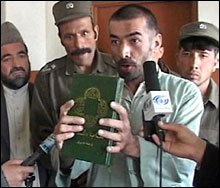Afghan death penalty recap and Vatican's strategy

Under pressure from the US, the Vatican, and other Western leaders, Afghanistan's fledgling democracy Sunday sidestepped a politically charged case in which prosecutors had sought the death penalty for a Muslim man who converted to Christianity.
Rather than pass judgment on Abdul Rahman, an Afghan who converted while living abroad 16 years ago, the court declared him mentally unfit for trial Sunday.
link
While state executions for apostasy are rarely carried out, laws allowing them remain on the books in not only Afghanistan but in Saudi Arabia, Iran, and Sudan.
More generally, while countries like Egypt and Pakistan guarantee religious freedoms in their constitutions, they limit religious speech and local police frequently lean on people to recant if they seek to convert.
Last year for instance, Egyptian Christians and Muslims clashed over a girl the Christians claimed had been forced to convert to Islam. The Muslim side said the girl was a willing convert, and had married a Muslim.
In Pakistani villages, Muslims who convert to Christianity are occasionally killed by their own family members, to protect the family's honor. In major cities, Islamic militant groups have launched attacks against Christian churches for their supposed sympathy for America. In Alexandria, Egypt, last October, three rioters died as they sought to attack a church for distributing DVDs of a play deemed offensive to Islam.
Afghanistan is a deeply conservative country where 99 percent of the population is Muslim and an estimated 10,000 Christians can practice only in secret. Out on the street, many ordinary Afghans chimed in with the mullahs calling out at Friday prayers for Abdul Rahman to be put to death.
"The order of God is execution for this person and no one can change it. This person has denied God and the Koran and he should be punished in a way that will stop other Muslims from converting," said Sayed Saber, a 32-year-old in Kabul.
Most mainstream schools of Islamic jurisprudence call for converts to be executed. Though the Koran promises only hellfire for apostates and also says "there should be no compunction in religion,'' Islamic jurists have typically argued that execution is mandated, citing stories of comments made by the prophet Muhammad.
"The prophet Muhammad said that anyone who rejects Islam for another religion should be executed," said Mr. Mawlavezada, the judge.
Though some liberal Islamic scholars disagree, pointing out that no such rule exists in the Koran, they have been largely silenced in Afghanistan. Last year, Afghan writer Ali Mohaqeq Nasab spent almost three months in jail last autumn for an article questioning the traditional call for execution.
And the Vatican's long term strategy?
link
The United States-led wars on Iraq and Afghanistan should not be viewed as crusades launched by Christian countries against Muslims, and "Western" is not synonymous to "Christian," the head of the Vatican's Pontifical Council for Interfaith Dialogue said on Sunday, March 26.
"This is a very damaging confusion," Cardinal Paul Poupard, also the Vatican's Culture Minister since 1988, told Reuters.
"Pope Benedict XVI, like his predecessor John Paul II, never ceases to say this and show it by his acts, such as opposition to armed intervention in Iraq," he said.
He said that the church is not "western."
"It is catholic," he stressed, using the term derived from the Greek word for "universal."
Poupard, 75, has also turned a spotlight on the role that culture can play in fostering understanding between Muslims and Christians.
"Culture plays a fundamental role for relations between Christians and Muslims," he told Reuters.
"Benedict XVI clearly told me we had to develop the dialogue of men of culture with representatives of non-Christian religions," the French cardinal said.
He recalled that the Pope told Muslim leaders in Germany last August that Christian-Muslim dialogue was "a vital necessity on which in large measure our future depends".
A leading theologian before becoming Pope last April, Benedict has long thought contact with non-Christians should not focus only on religion, where agreement can be difficult if not impossible, Reuters said.
Good Luck.




0 Comments:
Post a Comment
<< Home